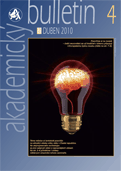Academy of Sciences of the Czech republic › Science and Research › Programmes of Research and Development › Programme "Information Society" (2004-2009)
Detailed information about the programme
2. Identification data of the programme
3. General goals of the programme
4. Structure and specific goals of the programme
5. Operating period of the programme
6. Financing of the programme
7. Evaluation of the success of the project solutions
Information Society
Thematic programme II (TP2) of the National Research Programme I approved by the Czech Government, Decree No. 417, dated April 28, 2003. Code CEP: 1E
The target of the programme is to support basic knowledge-oriented research enabling the development of information technologies and to apply this piece of knowledge, and the technologies based on it, in the production, communication and management spheres.
The basic attribute of the projects which can apply for financial support from the Programme will therefore be their specialization on the process of acquisition, transfer, holding and making use of information which can be defined as data and new knowledge.
From the interconnection with technology point of view, it will consider the projects oriented to computer and communication engineering, both from the instrumental and mechanical points of view (hardware) and communication infrastructure development, and in the area of theoretical and programme solutions (software), including especially mathematics and computer modelling of natural and also artificial systems, development of Artificial Intelligence systems and knowledge management systems, and data storage and processing.
Programme "Information Society" has 4 sections (sub-programmes):
Sub-programme (TP2-DP1) Intelligent decision making, management and diagnostic systems
Sub-programme (TP2-DP2) Information and knowledge management
Sub-programme (TP2-DP3) Communication infrastructure and technology
Sub-programme (TP2-DP4) Computer modelling and proposal of systems and processes
4.1. Sub-programme (TP2-DP1)
INTELLIGENT DECISION MAKING, MANAGEMENT AND DIAGNOSTIC SYSTEMS
Sub-programme has following priorities and corresponding key research directions:
4.1.1. Automatic control and data collection systems
4.1.2. Artificial Intelligence and it´s application
4.1.3. Development of sensors, actuators and means for interactive communication between man and machine
4.1.4. Development of transport telematics and intelligence transport systems
Goals of sub-programme (TP2-DP1):
- to work out the metodics of a concept of transport telematic systems in the Czech Republic with reference to their architecture, telecommunication, navigation and management support,
- to develop technically improved sensors and means for interaction between man and machine,
- to work out methods of intelligent data and knowledge processing for securing actual needs of technical diagnostics,
- to develop methods of Artificial Intelligence necessary to secure smart functions of decision-making and control systems.
4.2. Sub-programme (TP2-DP2)
INFORMATION AND KNOWLEDGE MANAGEMENT
Sub-programme has the following priorities and corresponding key research directions:
4.2.1. Knowledge society and new forms of education
4.2.2. Information and knowledge systems including personal systems
4.2.3. Electronic documentation in health, social and public administration systems
4.2.4. Conception, execution and application of widely distributed computing, database and information systems
Targets of sub-programme (TP2-DP2):
- to develop research oriented on problems of knowledge management with regard to the needs of Czech industry (also regarding competitiveness of export),
- to concentrate on modern information network implementation, especially Grid, and on the development of ways of their effective use in different sectors,
- to develop techniques supporting the creation of large information systems and long-distance access to them and also develop systems of telemedicine,
- to develop the means necessary for storing electronic medical documents and to complete the project of a unified identification chip card for citizens.
4.3. Sub-programme (TP2-DP3)
COMMUNICATION INFRASTRUCTURE AND TECHNOLOGY
Sub-programme has following priorities and corresponding key research directions:
4.3.1. to develop research of a universal, multifunctional and secure communication system
4.3.2. to develop technologies of communication infrastructure, especially an access network
4.3.3. to develop digital TV and broadcasting systems oriented on digital terrestrial TV
4.3.4. research devices and equipment working on principles of quantum, statistic and wave optics and for optic communication
Goals of sub-programme (TP2-DP3):
- creating a polyfunctional communication network including security and data protection,
- implementing digital TV and broadcasting, rendition of interactive information services,
- using terrestrial digital TV,
- developing devices and equipment working on principles of quantum, statistic and wave optics and for optic communication.
4.3. Sub-programme (TP2-DP4)
COMPUTER MODELLING AND A CONCEPT OF SYSTEMS AND PROCESSES
Sub-programme has the following priorities and corresponding key research directions:
4.4.1. technology of computer modelling and simulation, both from mathematical and informational points of view
4.4.2. development and application of devices and equipment for mathematical and computer modelling, simulation and visualisation
4.4.3. developing complicated integrated customer systems (designed to support the export of highly qualified work)
4.4.4. developing methodologies, technologies and equipment of software engineering aimed at shortening the cycles of evolution and make it more effective, and in this way create competitive advantages for the software industry in the Czech Republic
Goals of sub-programme (TP2-DP4):
- to develop the means for mathematical and computer modelling, simulation of systems and visualisation,
- modelling and description of complicated integrated monolithic circuits and systems, including complex systems on one chip,
- making use of software engineering.
The programme is in effect for the period 2004 - 2009. It was launched July 1, 2004 and it is expected to end December 31, 2009. Duration of the project handling will be from 2 to 5 years.
The support of selected projects comes from financial means set off in the budget chapter of the Academy of Sciences of the Czech Republic for the programme "Information Society".
It is expected that the total share of the purpose-oriented grant-in-aid from public funds on accepted costs will be 95% for the whole programme. The share of the purpose-oriented grant-in-aid of each project in all particular programmes can be up to 100% of accepted costs. If the project includes also industrial research and/or development, the total share of the purpose-oriented grant-in-aid on accepted costs will be calculated as a weighted sum of the amounts accepted on the basis of the limits of the purpose-oriented grant-in-aid for individual parts of the research and development in accordance with paragraphs 1 and 2, article 2 of the Government's Act No. 461/2002 Coll.
The form of granting purpose-oriented grant-in-aid by the provider
The purpose-oriented grant-in-aid from public funds entrusted to the accepter for selected projects of research and development is provided for R&D by the Academy of Sciences of the Czech Republic as a subsidy to the legal or physical person or by increasing expenditures of state administration bodies. The allocated financial means can cover such project handling as:
- personal costs (including wage or salary means, respectively, their aliquot part, of the people employed exclusively for the project handling, quittances to the members of the handling team and other personal costs);
- legal payments, eventually payments to the cultural and social needs fund;
- means for acquisition of tangible and intangible assets necessary for the project handling correspondent during the period of project handling;
- means for depreciation, maintenance and repair of present assets used for project handling;
- cost of operation and other costs;
- costs of services;
- travel costs;
- costs of international co-operation;
- costs of publishing results;
- costs to properly protect rights to results;
- operating costs.
Concrete total amount of purpose-oriented grant-in-aid projects as well as the amount of grant-in-aid for individual years is set by the provider based on the evaluation of the project concepts and continuing projects evaluation.
There is no claim for the purpose-oriented grant-in-aid.
Project handling is regularly monitored and evaluated annually by a special advisory board of the provider (Programme Council) based on partial evaluations submitted by the handling subject always at the end of the calendar year, a deadline set by the provider.
If it was determined that the project was solved on an unsuitable expert level or if insufficiencies were discovered in the purpose-oriented grant-in-aid managing made available, the provider can stop the grant-in-aid.
For the overall project handling and evaluation of the successful solution, the handling subject will submit a final report including evidence of the method used in the solution and achieved results, no later than 30 days after completing the project.
Ongoing and Final Project Evaluation Criteria
The following main criteria are set for the ongoing project evaluation:
- level of project performance compared with its goal (i.e., was the goal of the project achieved on schedule and if there is a realistic resolution for their achievements),
- quantity and quality of the achieved results (if the currently achieved results and outputs are at a high international, high-quality nationa, average or below standard level) and if the attained number of the results is sufficient,
- suitability of financial means drawn (were the financial means drawn according to the task and were they effectively expended).
For the final evaluation of the project, handling results are established by the following main criteria:
- level of fulfilment, the project aims including the extent of their exercise (if the set objectives were fulfilled and if the results prove useful),
- quantity and quality of the achieved results (if the results achieved so far and outputs reach high international, high-quality national average or below standard level) and if the number of the results attained is sufficient,
- sufficiency of financial means drawn (if the financial means are drawn according to the task and if they were effectively expended).
- fulfilment of the partial programme targets (were the achieved results and are outputs in accordance with the partial programme goals).
The Programme Council will work out the Final Protocol for each completed project and state it's definitive finding. The final evaluation of the project handling results is approved by the Academy Council of the AS CR based on the recommendation of the Programme Council.



